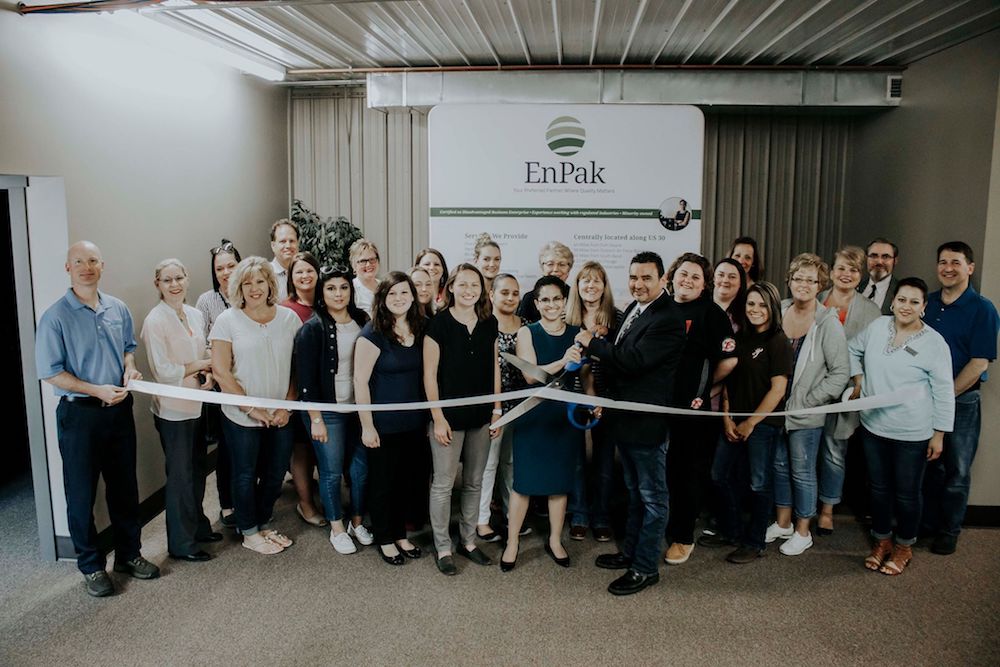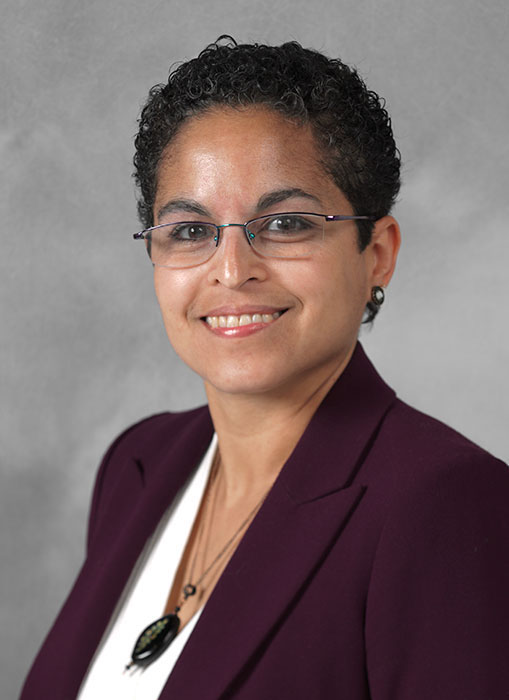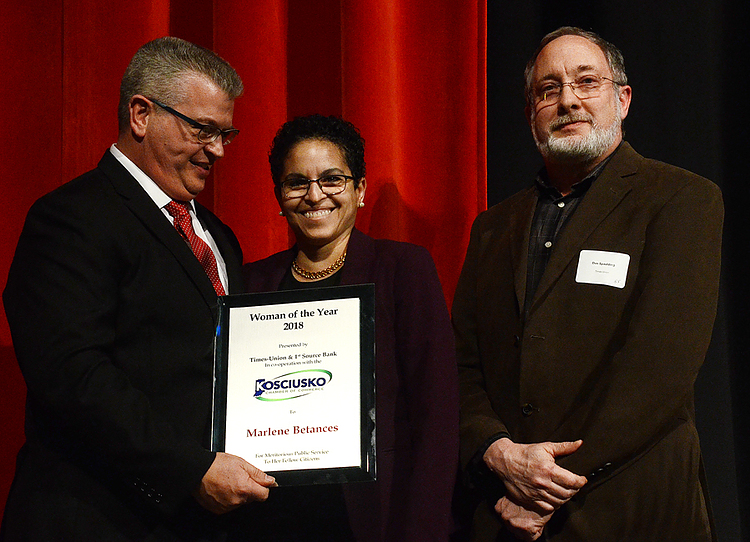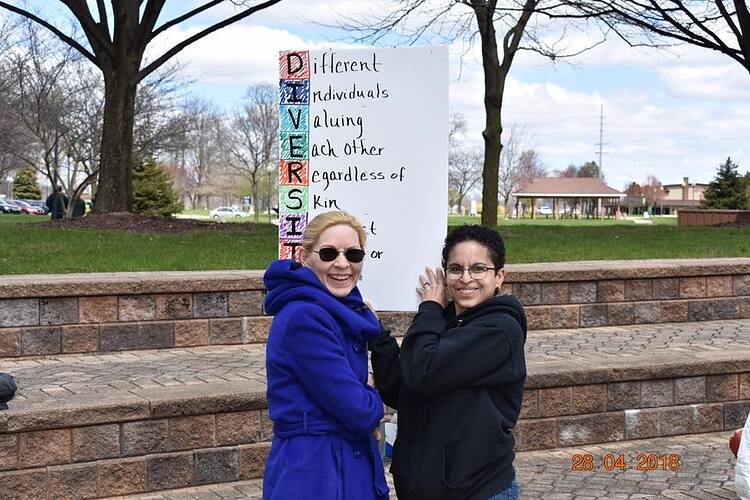Ciara Knisely | Wednesday, February 13, 2019 | Input Fort Wayne

Marlene Mulero-Betances co-founded EnPak, LLC., and has been running it full-time for three years.
Throughout her life, Marlene Mulero-Betances’s path has been defined by two things: the importance of education as a means to achieving her goals, and the willingness to jump into new opportunities headfirst.
After being raised by a single mother in Manhattan and graduating from Cornell University, she dove into a career in regulatory compliance auditing and quality systems and landed a job with Johnson & Johnson on the East Coast.

Then, when Johnson & Johnson acquired DePuy Synthes (formerly DePuy), Mulero-Betances and her husband took a leap of faith, relocating to Warsaw in 1999 so she could help build a team there—in the heart of the Orthopedic Capital of the World.
Today, she is an active member of the Warsaw community and a rising entrepreneur carving out a niche for herself in the orthopedic industry.
About eight years ago, she and a colleague at DePuy combined more than 40 years of industry experience to launch EnPak, LLC., which helps medical device manufacturers and suppliers with labeling needs, quality checks, and distribution.
For the past three years, Mulero-Betances has been running the company full-time and giving back to her new hometown on several boards and committees—many of which serve women and people of color.
For these reasons and more, she was named Kosciusko Chamber of Commerce’s 2018 Woman of the Year.
Input Fort Wayne sat down with Mulero-Betances to learn more about her background and her experience as an innovator and entrepreneur in the Orthopedic Capital of the World.
IFW: Tell us about your background and how education has played a role in shaping your achievements.
MMB: I grew up in New York City, living in Manhattan, with a single mom. My grandmother lived with us as well. My parents divorced when I was young, and my mother didn’t have great relationships, so I grew up with very strong women, and men who were unreliable.
My mom worked in textiles first, but then she got laid off and moved into accounting for an insurance company. She earned her bachelor’s degree while I was in middle school, so education was always very important in our family, and being able to support yourself.
My focus was: I need to be educated, get a college degree, and leave. I was growing up in the 80s in New York, and it was the crack epidemic, with really ugly crimes, so I wanted desperately to get out.
IFW: How did you do it?
MMB: I had an aptitude for math and science, so I ended up studying mechanical engineering at Cornell University. When I graduated in 1993, my first job was in Rochester, NY, working for a microwave communications company.
I started out in regulatory compliance, so I learned quality systems development in my first job. Then I took it to the next level in my second job with Johnson & Johnson, getting into FDA regulations and standards.
I was doing supplier audits and going to suppliers all over the place that were doing all kinds of things—making raw materials, sterilizing products, and machining parts.
From there, I was recruited to work for a Johnson & Johnson instrument manufacturing facility in New Bedford, MA. Then Johnson & Johnson acquired DePuy, and one of the team members of my group was moving out here to manage the compliance team, so he asked me to relocate with him.

IFW: What did you think of moving to Warsaw at first?
MMB: It was weird, at first, because being an East Coaster, you don’t even consider coming out to the Midwest. Butwhen I came out here, I found that there was more opportunity here than I realized.
My husband and I had been looking at houses in Massachusetts, and it was just ridiculous. We looked at the price of houses here and the growth opportunity, and we decided to relocate.
So we came out in 1999, about 20 years ago, and it’s changed a lot since then.
IFW: It sounds like you’ve changed a lot, too. You earned a master’s degree and launched a company in Warsaw. Tell us about how you’ve grown professionally since moving here.
MMB: At Johnson & Johnson, I was given the opportunity to manage a label development group, and I didn’t have any experience with regulatory requirements around labeling, so I got my master’s in Quality and Regulatory Affairs via video conference courses by Temple University, and Johnson & Johnson paid for it.
Then I was managing a label development team, and from that, I became a business lead of a project to implement a worldwide labeling system.
After doing that for several years, I moved into a role in the IT department and worked there for a few years as well.
I eventually became the senior IT leader in Warsaw, and I helped the company through the acquisition of Synthes.
IFW: What inspired you to make the move into entrepreneurship?
MMB: About eight years ago, when we were going through organizational changes, some friends at DePuy and I decided we would try to start a company. So we went to HR and Johnson & Johnson legal and got approval to start EnPak, LLC., while we were still DePuy employees.
That’s how EnPak was born. We were taking the expertise that we had to see if we could make something happen and make a difference in the community.
It was fun to try and figure it out, but there was really no risk because we all had full-time jobs, so it was like, “Let’s see if we can build something.”
Then, about five years ago, my position at DePuy was being eliminated as the company evolved, so I decided to focus on EnPak full-time. I’ve been running it for about 3 years now, and I still have a partner who works for DePuy, but he’s not involved.
IFW: Warsaw has a very dense orthopedic industry, so it makes sense that you launched your company there. Tell us more about what EnPak does.
MMB: What we do is bring my quality system experience with my label development experience together, and we specialize in supporting medical device companies when they have a special need for unique labeling.
Sometimes that happens because you’ve purchased a company, and you want everything to be under the new name, or there’s a quality issue with the label, so everything needs to be repackaged, or it’s damaged, and it needs to be repackaged.
We also partner with startup medical device companies to be their distribution center, so we warehouse their products and fill their customer orders.
Those are the two niches I’m trying to build, and so far, we have 3 employees.

IFW: You do a lot of work supporting the Warsaw community, too. You’re a board member for the Kosciusko County Community Foundation and a member of the OrthoWorx Diversity Committee. You’re also a founding member of We Inspire Support Empower (WISE), Inc. supporting the interests of career women, and founder and co-chair for the DePuy Synthes Warsaw Hispanic Organization of Leadership and Achievement and Women’s Leadership Initiative chapters. Tell us more about what inspired you to get involved and give back.
MMB: I started to get really involved in the community about 10 years ago when I was volunteered by DePuy to be a representative for OrthoWorx. Then the Diversity Committee formed, and the rest is history.
When you become a volunteer and get engaged, by virtue of what you’re doing, you’re surrounded by people who feel the same way, so you feed off each other’s energy because it just feels natural—that this is what people should do.
My love of this community is rooted in getting to know so many good people. There are people who do so much here, but don’t want anybody to know they’re doing it, and they make such a big impact in lives. It just fills my heart.
For all intents and purpose, I grew up here in my adulthood. I’ve been surrounded by that by virtue of how I choose to spend my time. It gives me hope that, as a country, we can work through our issues as long as we attempt it, and we value people, and take the time to understand their perspectives.
It won’t happen overnight, but it’ll happen. It’s a matter exposure; it’s a matter of us taking responsibility for making that impression and changing those perceptions, making sure we aren’t being offended, but we’re going in open-hearted trying to understand and influence. That’s what keeps me here.
When we, as POC (people of color), are willing to give our own time to help change opinions and understand that we have a responsibility, I think that makes a big difference.
IFW: What advice do you have for other budding entrepreneurs?
MMB: If you have an idea of what it is you want to do, an industry, type of product, service—work for someone else first. You’re not going to know what it’s going to be like, but you have to understand the fundamentals involved in the kind of business you want.
Don’t be afraid to ask for help. There are people everywhere willing to give a helping hand and guidance and listen and point you in the right direction. And know that whatever happens, happens, and you did what you could.


